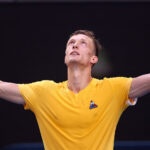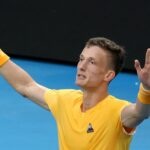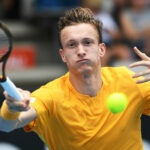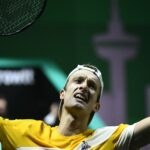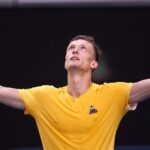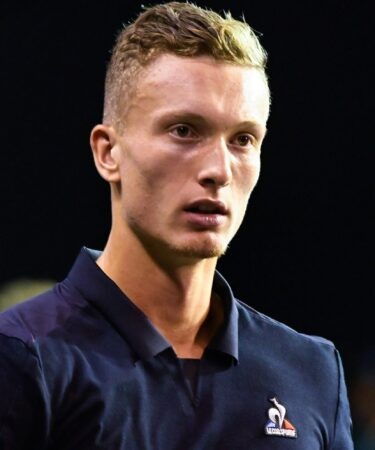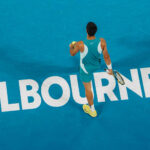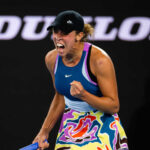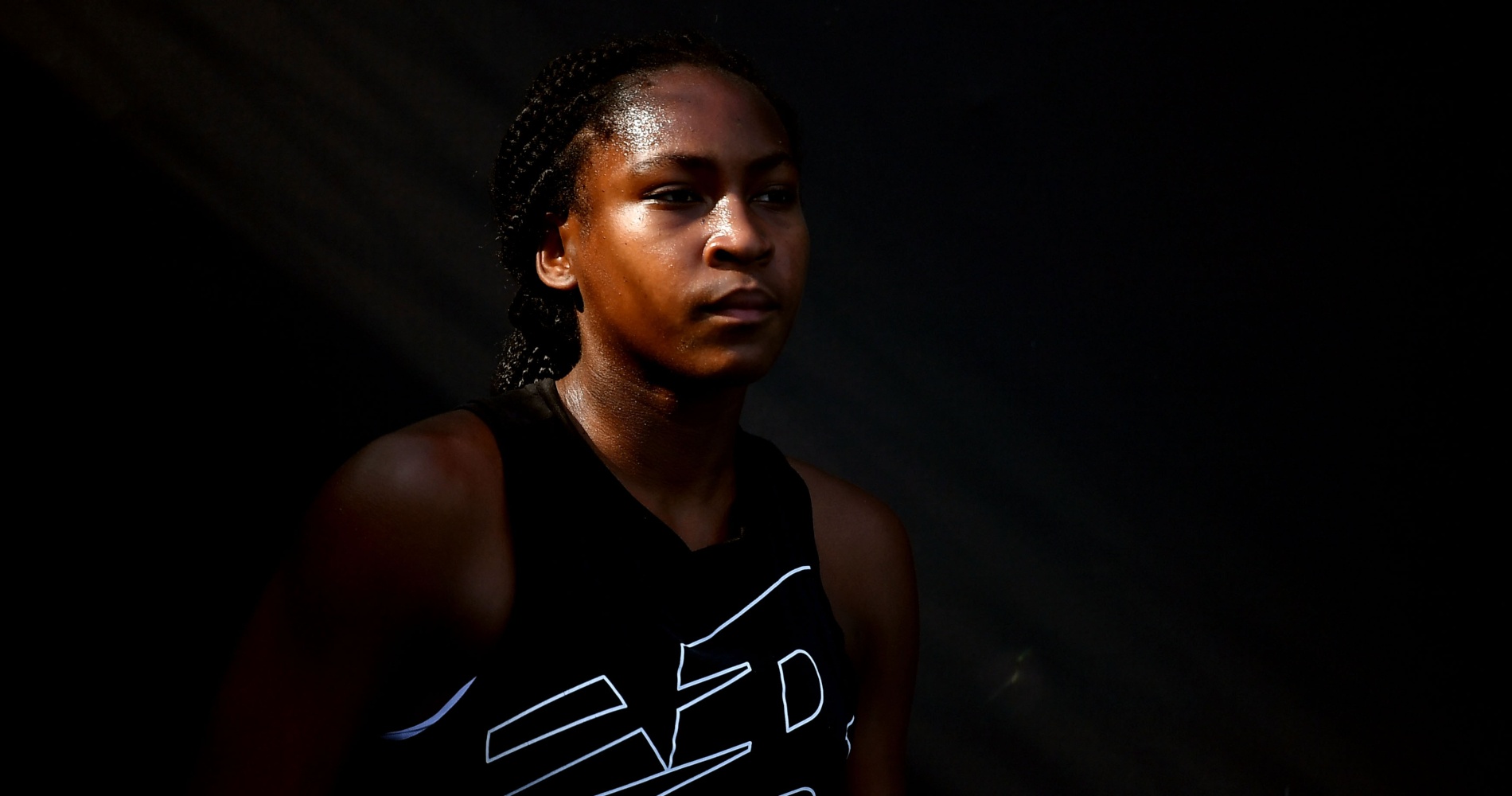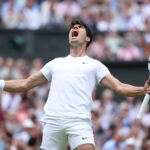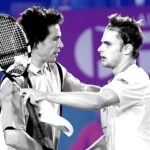Jiri Lehecka: “I knew I could beat the top guys”
Jiri Lehecka has a big game and big talk – and big results to back it all up. Carole Bouchard chats to him and his team about his red-hot run to start 2023
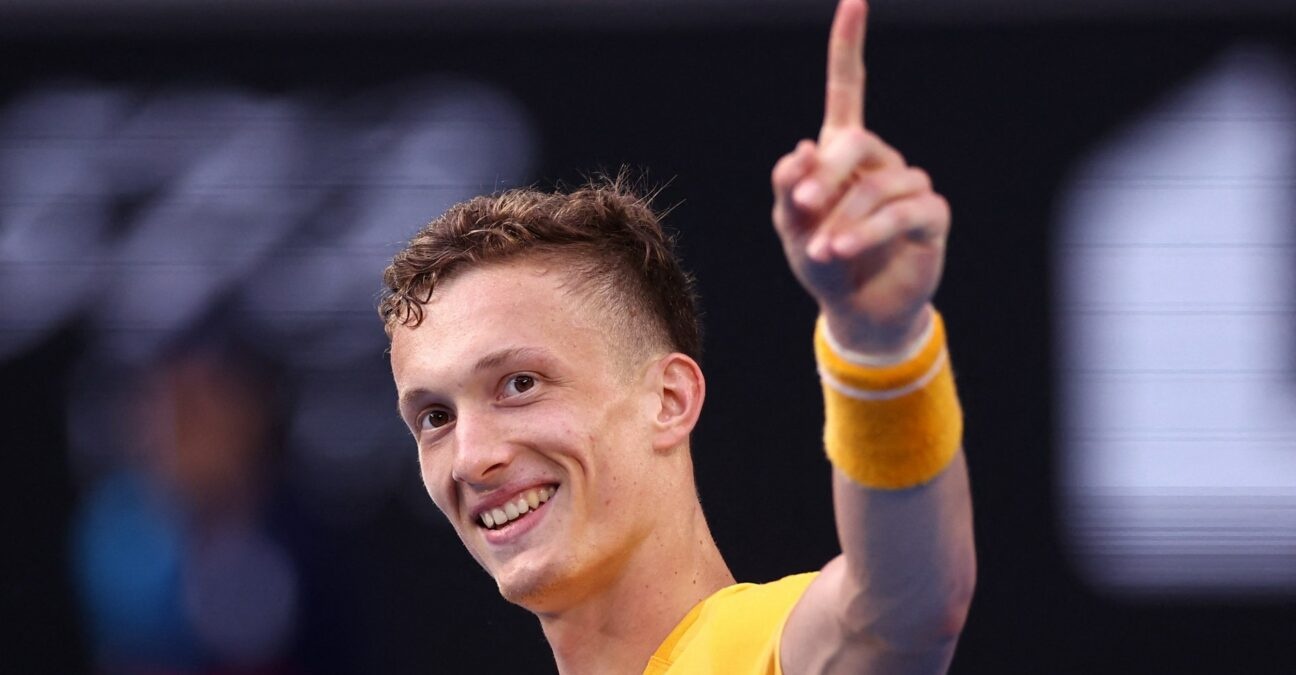 Jiri Lehecka 2024 (© AI / Reuters / Panoramic)
Jiri Lehecka 2024 (© AI / Reuters / Panoramic)
Jiri Lehecka is already one of the names of the start of the year and his game is showing all the potential needed to make it big on the tour. What is still maybe even more fascinating with him is that he is not surprised at all by anything that has happened to him for now. In his mind, he has belonged here for a while.
“I was thinking it would be great to finish the year in the Top 50. And now I’ve jumped into the Top 50 after only my second tournament of the year.” It’s a matter-of-fact statement but the way Lehecka smiles after saying it is everything but matter-of-fact. There’s pride in there but also a sign that it just means it’s already time to reach out for more. You speak to some up-and-coming players after their first breakthrough and their eyes are still wide open, they’re on cloud nine and can’t believe they did what they did. Then sometimes you speak to others and you feel they’re exactly where they thought they should be, and now they’re asking for more. In the case of Jiri Lehecka, it’s absolutely the latter.
That’s actually as much down to his striking figure as his hammer-like forehand or the speed of his serve. Jiri Lehecka, 21-year-old, is not surprised to be Top 50 after two tournaments in 2023 and he’s not surprised either that it happened because he reached his first Grand Slam quarter-final. All of this seems to be within the realm of his expectations and there’s very little euphoria, which is another sign that you might be dealing with someone worthy of the “real deal” title. There’s no arrogance in any of that, quite the opposite, as the Czech is very down to earth and humble about it all when you talk with him: it’s just that he’s not playing the sport to be over the moon about a Grand Slam quarter-final, and he’s not hiding it.
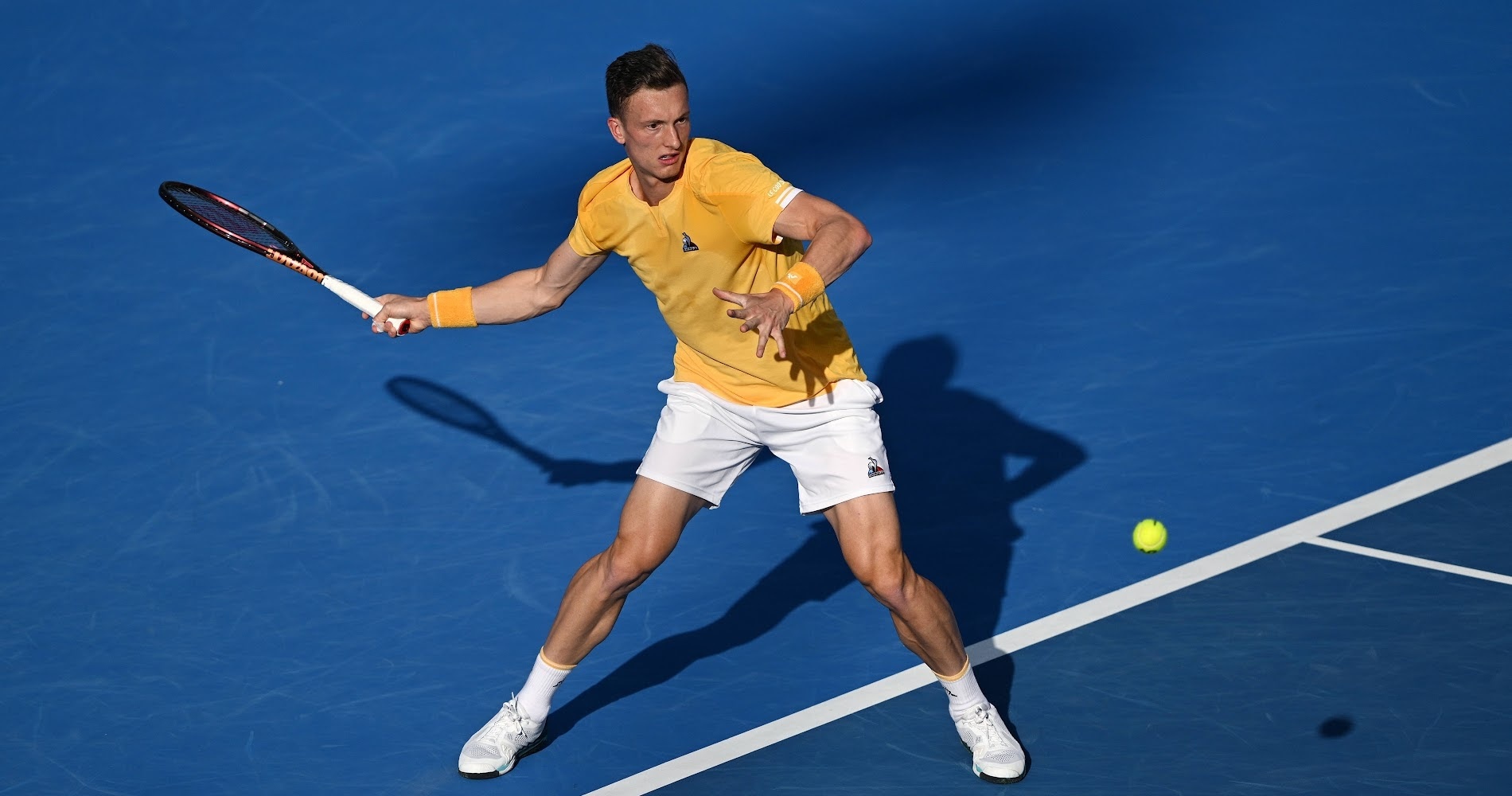
“I knew – and I felt it even last year – that my game is there, that I know how to play. I knew that when I played pretty well I could have great results, that I could really beat the top guys,” he says when asked how come he finds a way to behave as if he already belongs at the top. “The key for me was to keep consistent and to show these performances through several matches. The Next Gen Finals helped me a lot at the end of last year to gain some confidence, and to show everyone, and myself how well I can play. Then beating Zverev at the United Cup gave me some confidence as well and from that moment I was on the right path to doing something great and playing my game. So I will just continue to do what I believe is best for my tennis as it showed that it was the right thing to do.”
“It was something planned in our mind”: Michal Navratil on Lehecka’s self-belief
And so he did in Doha. Clinching his first win over a Top 5 player on the way by nullifying Andrey Rublev’s power to assert his own. As he did in Melbourne against Felix Auger-Aliassime, Lehecka showed a very impressive display of controlled power and a very efficient tennis IQ. The kid is a quick learner, even during his matches: he’d switch strategies without a blink, turning himself into a “let’s take the net” player when baseline pressure wouldn’t be enough. He will not be scared to miss as long as he knows it’s the right game plan, and at some point, he will just stop missing. Not only you can hear his so heavy shots roaring but you can nearly hear his brain cells too. A problem-solving type of player with that kind of natural power? That’s a very good base to work from.
And the same in Qatar as in Australia: Lehecka shines and he’s not surprised one bit about it. It’s actually now already high time we stop being surprised about it!
“Of course, I know that for me this is another step forward,” he said of beating his first Top 5 player. “But the great advantage, which my team and I have, is that we see positive things in every win and also in every loss which helps us to learn faster from every situation we are in. In Doha, I went to the court in my first match as the favorite so it’s changing a lot but for me, the biggest goal is just to be happy with every win I’m able to have.”
Michal Navratil, Lehecka’s coach, explains that this self-belief that is showing this year has actually been a nice work in progress. He trained that kid to believe he could achieve the greatest things. “It was something planned in our mind. I always teach the player to become No 1 in the world and for example, when we told Jiri, ‘You are now in quarters,’ his answer was like, ‘But coach, I’m not surprised because we have been prepared for this, this is for what we work hard every day.’ It was just a matter of time.”
At 21, Lehecka is the newest face to start making waves. Finalist at the Next Gen Finals at the end of 2022, he has now become one of the players nobody on Tour would think is a good draw at any tournament. His run to the quarter-finals at the Australian Open was then later confirmed by a semi-final in Doha. A semi-final that he totally should have won against Andy Murray if he hadn’t had a few signs left of his youth and inexperience, missing five match points. Actually, it’s something that he struggled with last year, after reaching his first tour semi-final in Rotterdam, and that he had to overcome because it was starting to get into his head.
“This is now the year to use the experience I learned” – Lehecka
“Last year I had a chance to play against a few really good guys, and many times the matches were played really well from my side but in the crucial moments, I did some mistakes or didn’t play how I wanted to. Mentally it wasn’t very easy for me to handle all this pressure when I felt I was the one who should win that match. That’s also something I worked on pretty hard: how to learn from this situation and from the matches I lost. Last year really was full of experience for me but I can already feel that this year is much different because I’ve already done my first Top 100 season last year. This is now the year to use the experience I learned.”
That’s the other scary thing coming from Lehecka to the rest of the field: there are moments in matches when you can feel he’s so locked in that he is not going to be moved. It’s the wave coming crashing again and again and there’s just nothing you’re going to be able to do about it. It’s his sweet tennis spot, the zone he needs to reach to perform: lock the serve, lock the forehand, lock the mind. And then, for the rivals, it’s “good luck with that”.
“It was clear he had a huge game” – Andy Murray
That’s how he described how he dismantled Rublev: “In the first set it was more about getting used to the rhythm and getting used to what the tactics can be through the match. So I was trying to search, and I was looking for some specific things in his game where I can find his weakness and where I can push with my strengths. I found it at the end of the second set: he is a great player when you give him two same shots, and he can find his rhythm very easily. So for me, it was then about playing a bit more slices, maybe a few higher balls and that was the reason why I won the second set. In the third set, I don’t think that I changed something specifically: I just found my rhythm, and I just played my game. When I feel good, I can play some very good shots.” There’s something implacable and unwavering about Lehecka.
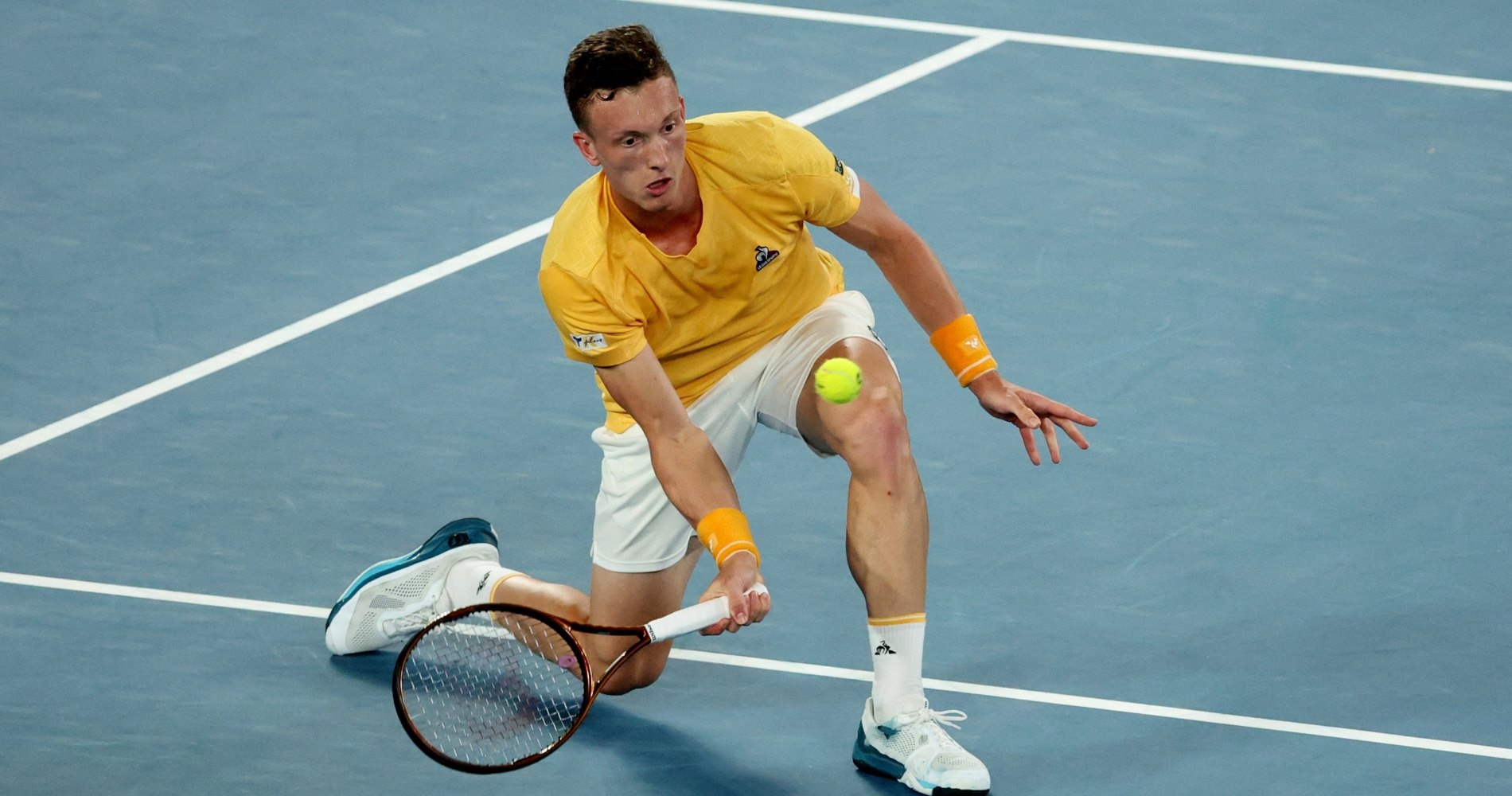
Andy Murray, whose judgment on the quality of the field can always be trusted, doesn’t hide that Lehecka impresses him, and especially because of how steady he can be in his highs. “I practised with him once before during the grass court season last year, and it was clear he had a huge game. He serves big. He’s a very clean ball striker. I don’t know why, but a lot of the Czech players, the best Czech players, are like that. He serves well. He hits big from both sides. When he’s on and he’s confident, he plays very well. I saw some of the match against Rublev and when he was behind, all of a sudden it clicked for him and he played great, the rest of the match. You need to try and find ways to break up his rhythm and make it difficult for him.”
We also saw that he can still be prone to a bit of a panic when the nerves kick in too strongly. And with his game style, it will sink him every time it happens as he cannot tolerate anything coming between him and his rhythm. It’s the only clear sign remaining nowadays that he’s actually just starting his career.
The Berdych model showed him the way
But coming back so strong after his performance in Melbourne was already a sign that we’re not dealing with someone who was just red hot in Australia, but with someone who can absolutely be a new force on tour. Another sign of how tough as nails the Czech already is: he went directly from Melbourne to the Davis Cup in the cold and on clay, and he won both matches. “I came back home on a Thursday afternoon and on Monday I was playing on clay in Portugal so the transition was very tough for me. On the tennis side, I can adapt pretty well, the surfaces of course I expected it’d be hard, but playing on a Tuesday in Melbourne at 45 degrees and then practicing indoors next Monday at 3 degrees… But we pushed through.”
He pushed through, that’s the motto. When you watch him play with this kind of relentless power and pressure, there’s obviously another Czech player that comes to mind. It also jumps into your mind when you see him serve or hit those unreal above-the-shoulder forehands from the back of the court. Tomas Berdych. That’s when it clicks: yes, I’ve seen that game before! And it’s no coincidence, here also it’s both mindset and work. Roger Federer was Lehecka’s tennis idol but the one he naturally modeled his game around is Berdych.
“At the end of last year, I knew my game was getting better but at the same time, I wasn’t where I wanted to be” – Lehecka
“When I was a little kid, Roger was the one who I was always looking up to. I always loved his game and his varied style. Then as I was getting older and I was getting a bit more into tennis and I was looking to the mirror as to what kind of player am I, then I was trying to focus my game and my style on Tomas Berdych. When I was 16, my coach was Jaroslav Navratil, who is the father of Michal, who is my coach right now. He’s the guy who got Tomas into the top 10, and he was with him for a long time. Maybe if you can see some specific details in my game, which can look a bit similar to Tomas, forehand, you know, something like that, then it’s a job of Jaro who took me under his guidance when I was 16. Tomas was the one who I was looking forward to and I was watching his matches in Davis Cup, everything. So I saw some similarities in both our games.” Always the Lehecka way: mixing a cold analytic mind with real sensitivity.
Yet when did that really click for him? When did he start to be able to act as if he’d been doing this at the top for years already? When did he start believing? It was not in a match, it was, as it actually often is with Lehecka, at practice. “At the end of last year, I knew my game was getting better but at the same time, I wasn’t where I wanted to be because I didn’t feel good on the court and didn’t have good results, out of the Next Gen Finals but there were no points. Most important thing was that at the end of last year, I found great consistency in my practices. Before, I felt I could play well but I could have one good practice and then a bad one, and then once or twice a week I’d play a horrible game. That was something I knew I needed to change and improve on a lot if I wanted to aim for the highest spots. Before the Next Gen Finals and right after, I saw this consistency was coming and it was showing in the matches.”
“Do not think too far, do not think about the past, and just give your best in every moment” – Lehecka
Results alone don’t reassure him that his self-belief is right. Work does. And that’s also how Lehecka intends to deal with the expectations that are now going to come his way: those coming from himself and the ones coming from people in general. He knows the type of pressure he can handle and he knows the one that will get him. “Had I played the Australian Open thinking about the fact that losing in the first round probably meant getting out of the Top 100 then it would be so much more difficult. So I just focused on myself, on the present moment, and not on what could happen. It helped to get even greater results. I of course know that dealing now with expectations is not easy to handle. But in the past couple of years, I still gained some experience in how to handle these situations and now the most important thing for me is to focus on every practice separately. To focus on every single ball I play. Do not think too far, do not think about the past, and just give your best in every moment. I believe this is the way to have the greatest results and keep my game at a high level.”
Michal Navratil is anyway here in case it becomes too much for Lehecka. He keeps an eye out and is determined to talk to him about anything and everything each time it feels necessary. There’s no taboo in that team. Lehecka doesn’t have to play strong. “I have experience with previous players so I know what I have to tell him. It’s important to have good communication and deep talks. I was reminding him of these things and warning him about what will happen, that he will have more solicitations and expectations from the people so he was prepared. Jiri is smart enough to hold all those things but of course, it’s important to speak about everything, to be ready for every change, and always continue to work hard and improve, in any case.”
Where does Navratil see the next room for improvement, by the way? “You still need to improve everything, there is always something to improve, especially on the court. We have worked a lot on stability, holding the body before the shot to have that stability and go forward, always being active in the game as it’s very important to adapt if something doesn’t work as well, having more plans (for example return from far, or just push, or be offensive), go to the net, etc. To be as much complete as possible.”
“It’s important to have good communication and deep talks” – Navratil
The only real issue Navratil actually has to deal with in Lehecka’s case is how to convince a racquet to hang in there with his power. This also says a lot of the work Lehecka still has to do to control his own game. Navratil explained it to the ATP at the end of last season. “He had a huge problem with the string,” Navratil said. “He was able to destroy the string in 10, 15 minutes. [It was] not even for the first ball change, so it was massive. So in the beginning he was really like a beast with so much power. But finally, he manages to control it. Still, I think he cannot play on the full percentage of his power because I think in this world there are no racquets he can go for full and he can control it.”
With that kind of natural power, one needs a cold mind and loads of self-belief. For now, Lehecka is checking everything on that list. He adds a very nice personality with hints that, with time passing, he will get more and more comfortable at putting into words the smiles and the twinkles you can see in his eyes from time to time when asked about how badly he might want it or what his true goals are. There’s a strong personality behind that very quiet and likable temperament.
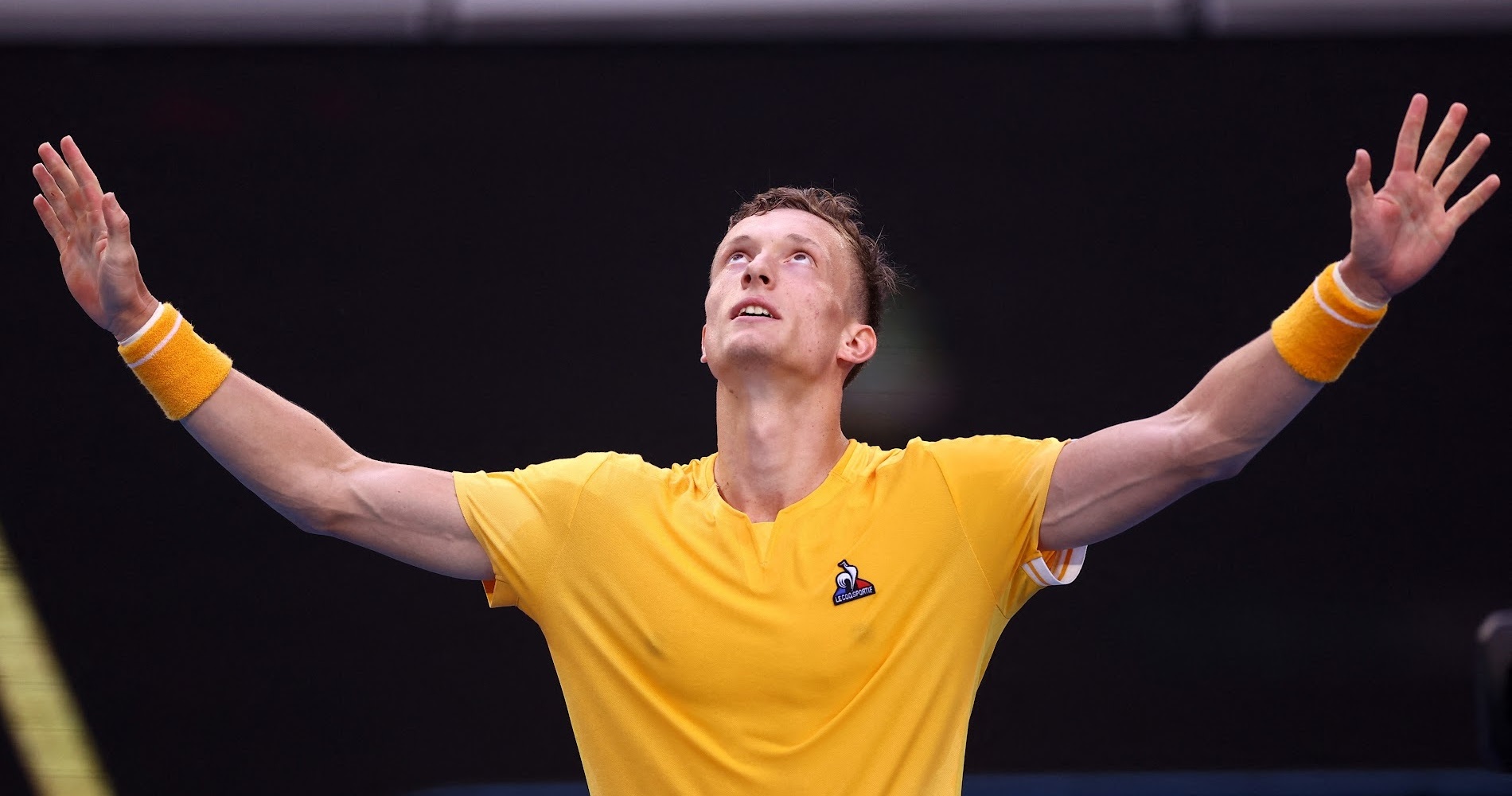
“It was always my dream to play in the biggest tournaments, to play on the biggest stages. It’s something I really enjoy doing. This was a good start to the year but it’s not the end of the season so I still need to work hard and play very well to stay there in the Top 50, gain experience, and not let anyone push me down, and then push myself even higher. (…) Gaining confidence was also key to improving, let’s say, the ‘big-time tennis’. I’m very happy that we pushed through and also with some adjustments in my game, focusing more on the serve, and on being calmer through the whole match. It also helps me to be more concentrated on the important points where, if I’m a bit lucky and I go for it, I’m able to produce some very good shots.”
Is he tempted from time to time to watch the replay of his amazing Melbourne run? He does, but for work reasons, not for his ego: “I didn’t watch any full matches because some were very long, but I watched a few interesting highlights with my team. We chose specific moments to see how to get better in those situations. We got back to see some of the break points I had against Stefanos Tsitsipas. That’s very helpful for us, to get a different perspective in order to improve. For me, it was very emotional to play a Grand Slam and to be in the quarterfinals and now it’s a big motivation to work harder and to prepare even more and play better tennis any time.” Jiri Lehecka, in 2023, is one of the most promising talents on the tour, and despite the fierce competition above him and in his own generation, he doesn’t see why he would not reach for the sky. And he has now walked a lot of his talk.
